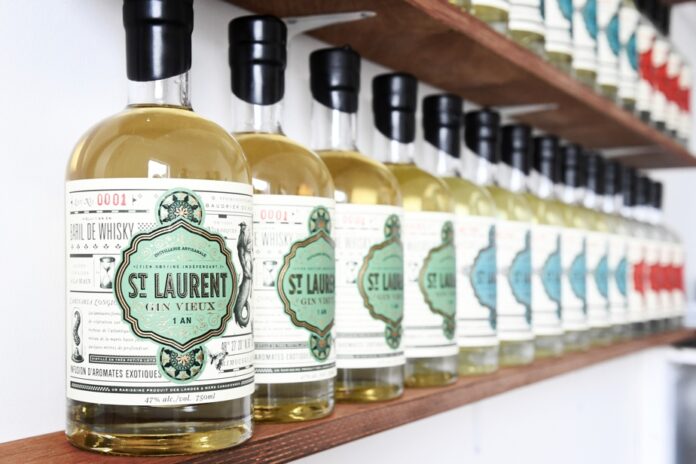By allowing all Quebec spirits to have the same visibility, the SAQ is stifling innovative local businesses, say Joël Pelletier and Jean-François Cloutier, owners of the St. Laurent Distillery.
Last month, this Bas-du-Fleuve company took shelter from its creditors.
The distillers sign a letter1 in which they accuse the SAQ, through its poor management of supply, of pulling the rug out from under the feet of companies which, under other conditions, would be profitable.
At the heart of their complaints is the fact that the SAQ offers all products from local distilleries. As there are more and more, this reduces the space for everyone. If a distillery wants to regain space, however, it can create a new drink. What many do, simply to recover sales.
“When a distillery sees that distribution is declining, despite the fact that the products are in demand, what are the choices they are left with to survive?” adds Joël Pelletier, who is also president of the Union québécoise des microdistilleries, in an interview.
Nicolas Duvernois, who is behind the popular drinks Pur Vodka and Romeo’s Gin, believes that the problem of Quebec spirits is much broader than the management of the supply of the SAQ.
“The first problem is the market,” he says. In the early 2010s, there were three or four microdistilleries in Quebec. Today, there are more than 70 producing more than 650 products. »
However, he says, Quebecers do not consume a lot of spirits. “We have a huge offer for a very small market. In the United States, 52% of sales are spirits. We are 5%. Just the rosé wine, it’s almost 7%. »
There are currently around 200 Quebec gins in the SAQ directory. Industry observers agree on one thing: it’s too much.
The SAQ is fully aware of this situation.
“Five years ago, gin had the wind in its sails with growth of 20% to 25% over five consecutive years,” said Simon Bourbeau, category director for Quebec products at the SAQ.
According to him, maturity has been reached, but the offer of gin and distilleries has continued.
“We find ourselves today with a very competitive market in Quebec spirits,” says Simon Bourbeau, who recalls in passing that it was the industry itself that had asked for a relaxation of the marketing rules.
What Joël Pelletier does not deny. “Now, it was not a request from the industry to tell the SAQ to remove any restrictions or to remove any calls for tenders to do an open bar. »
Gin St. Laurent, which was once distributed in more than 300 SAQ branches, is now only distributed in around 100, despite its popularity, as it gives way to its competitors. “In Quebec, we live or die with the SAQ,” says Joël Pelletier.
Faced with this crisis in Quebec spirits, the SAQ is showing an openness to reviewing its way of doing things and is already studying the market to find lasting solutions.
“We have always been great collaborators with the industry, we have supported it from the start, maintains Simon Bourbeau. Spirits is such a fast-moving industry. Trends are dynamic. We are not going to let the industry down today. We will move forward with them. »
However, for the St. Laurent Distillery, and others, it is midnight minus one.
The St. Laurent Distillery will not be the only one to find itself in a situation of insolvency, by the admission of its owners.
In 2022, two-thirds of small distilleries in Quebec were in deficit, according to the Union québécoise des microdistilleries.
Several companies that have invested in their infrastructure and that focus on direct sales and agrotourism are already in financial difficulty, estimates Joël Pelletier.
In Quebec, the law obliges the manufacturer who sells his bottle to the distillery – which has been permitted since 2018 – to offer it at the same price as at the SAQ.
For example, if the manufacturer sells his bottle for $10 at the SAQ and it is retailed for $40 in the branches, he will also have to sell the bottle for $40 in his tasting room, explains Joël Pelletier.
The producer has a discount (around $2) on that bottle sold on site, which doesn’t even cover operating costs or credit card fees, he says.
According to Joël Pelletier, if it were more profitable, small distillers would certainly choose this avenue, which would unclog the SAQ network.
His colleague Nicolas Duvernois approves this request. He believes, in fact, that the distiller selling to his home should only charge sales tax on his drink. However, he also reminds that any good entrepreneur must do a serious market analysis before launching a product.
A distillery that decides to go ahead with a new gin in Quebec must know that the market is already saturated, he says, and that, like it or not, the SAQ is a business partner. obligatory.
“I hope all the microdistillers who have started in the last few years have done their homework. And if you do your homework, you see that there is a state monopoly that controls sales and distribution, that there is very limited shelf space, that it takes major investments for installations and a minimal cost. You absolutely have to make the volume. »
Quebec should allow distillers to deliver their products to restaurants here, as winemakers can do.
State corporations, such as the Casino de Montréal (Loto-Québec), should favor alcohol from here. Even the parliament restaurant.
Distillers should be able to sell directly to their customers online.
Quebec should offer aid to develop foreign markets – Quebec pork has been well supported to go to export markets, spirits should have the same possibilities.















